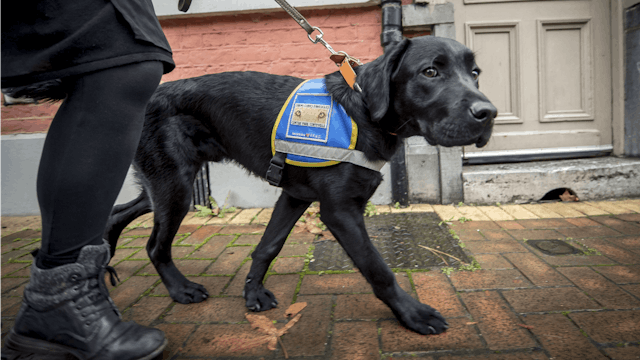Study Shows That Even Puppies Are Suffering Under The Wrath Of The Helicopter Mom

Well, it turns out that helicopter parenting isn’t just a human phenomena. Even puppies can have mothers who hover too much and ultimately hamper their furry children’s success in life.
Guide dogs are amazing, helpful companions for people with disabilities, from guiding the blind, to detecting seizures, to being emotional companions. Experts say, “A successful guide dog must navigate a complex world, avoid distractions, and respond adaptively to unpredictable events.” They even need to be able to know when to be disobedient to keep their people safe — and holy shit, are they smart. My dog was walking around the world completely terrified of plastic bags and brooms. He would not have passed this kind of training.
Future guide dogs have to go through rigorous programs in order to do their jobs effectively, but some puppies don’t end up making the cut.
A recent study published in the Proceedings of the National Academy of Sciences looked at those dogs that flunked out of training and determined that puppies who were raised by an overly protective mother were more likely to fail in these programs.
Emily Bray, one of the scientists conducting the study, explained that there are two types of dog mothers: those who are more “hands-off” or what we, as humans, might call “free-range,” and then those mothers who are over-involved. She describes the hands-on puppy mother like accordingly: “[A] hands-on mother is going to be constantly in the pool, licking them, grooming them, interacting with them.”
Or you know, calling their teacher every day at school to make sure they’ve passed their test or washed their hands after going to the bathroom.
Anyway…
This study is actually very fascinating. Out of the 98 puppies that they looked at, only around 70% were able to make it all the way through guide training school, and the puppies who failed had a lot in common. Not only were their mothers more attentive, but they also nursed their puppies in different positions. What? The successful puppies had mothers who stood or sat while they nursed, making the puppies work for it. The least successful puppies had mothers who lay down.
After reading this, I feel like maybe I didn’t make my babies work for their milk hard enough.
The authors of the study hypothesized that all of the small challenges that the puppies had to overcome in life helped them to be able to face challenges as adults. Bray says, “It’s good for the puppies to have these small challenges to overcome, like not having the mother around, rather than having the mom there all the time, not letting them experience things on their own.” Huh, sounds familiar.
The mother dogs who coddled their puppies also had more of the stress hormone cortisol, passing this on to their puppies, which could also be a factor in their successes or failures.
Is anybody hearing this?
These helicopter dog mothers are killing themselves trying to do everything for their puppies, and they are stressing the fuck out. You can’t be everything for everyone, Helicopter Mom Dog. You gotta go chill with your bitches at the park every once in a while. Let those babies struggle a bit, or they’re going to flunk out of guide school and be right back home in your backyard, tearing shit up and stealing all the good treats.
So, I’m going to take the advice of the “hands-off” mom dogs because, well, science.